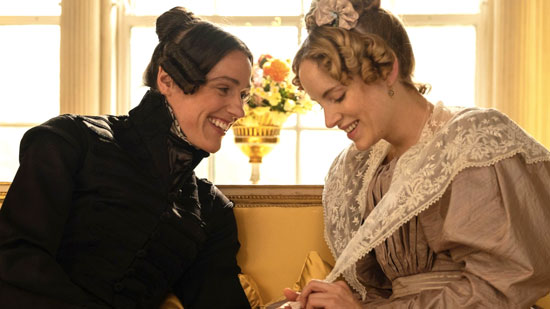Last Updated on October 1, 2019
“Are you a man?” a young, feverish boy asks Anne Lister, as she presses her hand to his forehead.
“Well,” she says. “That’s a… question.”

To help keep this site running: Willow and Thatch may receive a commission when you click on any of the links on our site and make a purchase after doing so.
Anne (Suranne Jones) is not a man, but she’s not like the women around her, who sit primly in drawing rooms wearing pastel frocks with enormous balloon sleeves. She, clad in black, strides along the circa 1830s cobblestone streets of England’s Halifax, the layers of her frock coat flapping madly like the wings of a bat. Sartorially, she is just shy of being a gentleman, her curled hair and floor-length skirt offering a few small concessions to femininity.
With a reputation for strident eccentricity, no-nonsense business dealings, and scandalous behavior of the sapphic sort, Anne is a character indeed. But “Gentleman” Jack didn’t originate in a writer’s room; writer-director Sally Wainwright based the BBC / HBO series on the encrypted diaries of landowner Anne Lister (1791-1840), who has been dubbed “the first modern lesbian.”
Lister wrote four million words’ worth of diaries in her lifetime, one-sixth of which were encoded in an algebra- and Greek-influenced cipher of her own devising. When John Lister, an antiquarian and descendant of the family, cracked the code in the 1890s, he discovered that the encrypted portions described Anne’s affairs with women in intimate detail. John was alarmed, but ignored his friend Arthur Burrell’s advice to burn the information to ashes. It wasn’t until a century later that the first volume of Anne’s diaries, I Know My Own Heart, was published.
In the first episode of this wonderfully thoughtful, compelling series, Anne, aged 40-ish, returns from Hastings, to stay with, in her words, her “shabby little family” in Halifax. Anne is perceived, within her family and beyond it, as an odd duck, and her reputation for suspiciously close female friendships precedes her. The reason for her homecoming is something of a mystery, but it seems to do with a falling out between her and a Miss Hobart (Jodhi May). In a flashback scene, we get a better sense of what happened. Clearly, the two were lovers. At the news Miss Hobart will be getting married—to a man, of course—the seemingly stoic Anne falls to her knees, clutches at Miss Hobart’s skirts, and wails like an orphaned child. This is a wound to the heart that will never heal, and it charts the course for the rest of her romantic life.
Facing this yawning chasm of loss, Anne brushes herself off, does an about-turn, and sets her sights on Miss Ann Walker, a woman of some wealth whose lamb-like naivete betrays the fact that she is 29. As yet unmarried at this ripe old age, Miss Walker is, in Anne’s estimation, the perfect candidate to be her wife—in every way short of the law.
At first, the courtship of Miss Walker plays out like a game of strategy. In a series of group encounters, Anne approaches her with no small amount of swagger, turning the charm up to 11 and gradually encroaching on her personal space. Miss Walker is utterly enchanted, staring and stumbling in the face of such sophistication.
“The poor girl already seems thoroughly in love with me,” Anne says with a smug smile, breaking the fourth wall to address us directly. As a technique, especially in a period production, having the protagonist talk to the camera can feel like a cheap trick, but here it is used sparingly and to great effect: we become cheeky co-conspirators in Anne’s wooing efforts. And when she tells a white lie or flashes a knowing smile, it’s all part of the fun.
The stakes, though, have never been higher for Anne. Until now she has been abandoned by women she loved, forced to watch them ride off into the sunset with mediocre men. The most she gets is an occasional romantic rendezvous with one of these women, who spend a night or two in her bed, then head home to their husbands. She has always lived a compromised life. Now comes the chance to finally settle in to her preferred mode of domestic bliss with a well-off female “companion,” who would live with her at Shibden Hall, the Lister family estate.
Sophie Rundle is endearing as the bright-eyed but vulnerable Miss Walker, whose joyous self-realization in the wake of Anne’s attention is tempered by low confidence. The two are playful and passionate in their increasing intimacy, which they approach with mutual excitement and tenderness.
But along the way, Anne can’t help but take advantage, drawing Miss Walker in, exploiting her low self-esteem to ensure she becomes attached, and fast-tracking the relationship so the two can commit, cohabitate, and, with the help of Miss Walker’s fortune, fix up the ramshackle Shibden Hall. Miss Walker feels on top of the world when she’s with Anne. Even an anonymous letter warning her that “Miss Lister cannot be trusted in the company of women” fails to unsettle her.
With Miss Walker’s affections secured, Anne is faced with a thrilling reality: that her dream of having a fancy home and a wife to come home to may be within reach. Suddenly, it’s not a game anymore. Miss Walker, though, new to the idea of being in love with a woman, needs some time to adjust and process the whirlwind of feelings. Though initially able to brush off others’ criticism of Anne, she becomes more anxious as friends begin turning against her and acquaintances tell her she’s playing with fire. Miss Walker’s hesitations throw Anne further into frenzied attempts to placate, convince, and reassure. To simply be with one another is to overcome a daily torrent of doubts.
It is here that the brilliant Suranne Jones shines most brightly, playing confidence, denial, panic, and charm—sometimes all at once. Beneath Anne’s apparent authority and carefree nature lie fear and desperation that threaten to ruin her. Anne spends more and more time and energy trying to convince Miss Walker that everything will be okay, that they will not be shamed and ostracized, that their life together will be gloriously happy. All they have to do is walk proudly, act like they have nothing to hide, and be kind to the people around them, even as they experience more and more hostility.
It’s rare for a same-sex relationship to be the focus of a period drama, and “Gentleman Jack” feels revolutionary in that regard. But although the series will have particular appeal to queer women, there is much to enjoy for everyone. The Lister family is a hoot, especially Gemma Whelan as Anne’s killjoy sister Marian. The gorgeous costumes, designed by Tom Pye, serve to further delineate each character, from the innocent Miss Walker’s delicate pink taffeta dresses to the pocket watch the impatient Anne is constantly checking. And Suranne Jones, whose moxie dominates the show, is universally appealing.
The late Georgian era may not have been ready for Anne “Gentleman Jack” Lister, but fans of stylish, witty, trailblazing women will welcome her presence in 2019.
“Gentleman Jack” is AVAILABLE to STREAM.
Rated TV-MA (Contains brief nudity, but for the most part, layers of skirts remaining intact during sexual scenes.)
Read more about “Gentleman Jack,” and watch the trailer, here. Our Q&A with the costume designer is here.
Ella Morton is a New Zealand-born, Australian-raised, Brooklyn-based writer focusing on overlooked aspects of history and culture. She co-wrote the New York Times bestselling book Atlas Obscura: An Explorer’s Guide to the World’s Hidden Wonders and wrote Outback, a photicular book about Australian animals (Workman, October 2019).
As Senior Editor at Atlas Obscura, Ella assigned and edited stories on history, culture, and exploration from over 80 global writers. Ella is now writing a historical non-fiction book while working on special projects with The History Channel.
Be sure to see The Period Films List,with the best British, historical and costume dramas sorted by era. You’ll especially like the Best Period Dramas: Georgian and Regency Era List. You’ll also want to see our review of Wild Nights with Emily, The Favourite and the list of Strong Women in Period Dramas. 

